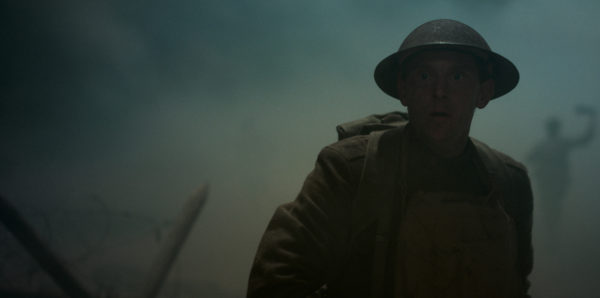
Shining Girls sidelines its present day storylines to focus exclusively on Harper’s backstory in a revealing episode.
Spoilers follow for episode 6. …
Missed a Review? Episodes 1-3 I 4 I 5
Episode 6 “Bright”: When Harper (Jamie Bell) returns home from war, he finds a new beginning
With only a few episodes left, it makes sense for Shining Girls to unpack the mysterious origins of its time travelling killer. “Screamer” doled out a few clues, including Harper’s mysterious connection to a house that causes him pain and a relationship to Leo (Christopher Denham), a man with ties to WWI who lives in the VA home where victim Julia Madrigal worked.
“Bright” puts everything to do with Kirby (Elisabeth Moss) and Dan (Wagner Moura)’s investigation aside for an episode wholly dedicated to Harper. It’s the kind of move that makes sense for a series that has limited real estate, but what writer Naledi Jackson accomplishes with this standalone episode is a lesson other shows could stand to learn.
Moss has always been the undeniable lead of the series: the show’s premise is built around her survivor character and how Kirby navigates the world in the aftermath of her attack. Shining Girls has made good use of both Moura and Bell (the former got a variation of his own episode with “Overnight”); more often than not, however, the pair are used to move the plot along or offer insight into Kirby. By focusing exclusively on a single secondary character, Jackson is able to not only offer insight into what makes Harper tick, but also dramatically fill in a number of the show’s narrative gaps in a single expedient episode.

After a brief glimpse of VHS footage of a younger, happy Kirby dancing with a mysterious blonde (later revealed to be Madeline Brewer‘s Klara), “Bright” zeroes in on Leo and Harper’s first meeting during a 1918 mustard gas attack in Cantigny, France. It’s hardly surprising to learn that Harper not only turns coward on the battlefield, but that he murders a fellow soldier to ensure his own survival (an act witnessed by Leo, who begins to blackmail him when they return home to find themselves unemployed).
Whether this is Harper’s first kill is less important than Leo’s later observation to Klara: the war didn’t change Harper; this is who he has always been. This statement – combined with Harper’s history of both petty theft and voyeurism – tracks with everything we know of the killer. Earlier in the episode he justifies his burglaries with a Robin Hood mentality (he is merely taking what he’s owed). He also protests that what Klara describes as “spying” and “peeping” is “looking out” for her. Harper doesn’t see right and wrong the same way as the rest of the world: he’s a disenfranchised white knight.
The reality, of course, is that he’s a common thief and a murderer who seizes an opportunity to capitalize on the unique properties of a magic house to act on his worst desires. As the episode’s emotional climax makes clear, this includes revisiting the same night he and Klara sleep together; a kind of time travel rape that allows him access to Klara’s body when he wants, without her knowledge or consent.

The other revelations that “Bright” delivers is clarifying how the house’s powers work. After murdering an old woman whose watch catches his attention, Harper and Leo discover a house filled with objects that change by themselves and allows Harper to time travel simply by thinking of a date. Intriguingly this power does not work for Leo or Klara, almost as though the house is sentient and has chosen Harper as the recipient of its unique properties.
There’s also a man living there who lasts just long enough to deliver a vaguely ominous message about “passing through” time before he runs into the street, is struck by a car and dies. This essentially bequeaths the house to Harper and Leo, and allows Harper access to women across the decades. Of course we know from “Screamer” that Harper cannot exist indefinitely outside of its walls and, as he tells Klara on their sojourn to the future, his visits are also capped by a specific date.
This limitation is intriguing, particularly as we head into the series’ final two episodes. Just as last week’s episode hinted that Jinny’s death in the first episode could be prevented, Klara’s question about the significance of Harper’s expiration date could – on the surface at least – suggest the date Harper is fated to die. After all, Shining Girls is prone to occasional bouts of foreshadowing within its time travel shenanigans.
Other Observations:
- Seeing Kirby jubilantly tending bar and delivering witty rejoinders to both Klara and Harper is another subtle twist of the knife when we know the fate the awaits her. Her personality in these pre-attack 80s scenes is so dramatically different than the aftermath.
- While Harper protests to Klara that he’s not interested in Kirby, he obviously has difficulty taking his eyes off her. So does Klara, for that matter, who gives off a heavy bisexual vibe. Could this be the reason that Klara didn’t respond to Harper’s letters when he was away at war, or is it just because she doesn’t like him all that much (their initial reunion is a toxic example of two people not listening to the other).
- Obviously now we know that Klara is the mystery blonde on the VHS tape that Leo stole from the house.
- Shout out to director Diana Reid for the beautiful full colour transition from the graves marked with white crosses that then stand out like beacons in the dark. Also: the lighting team deserve major props for the way sunbeams pierce like strobes through the house. It’s very mysterious and striking.
Shining Girls airs Fridays on Apple TV